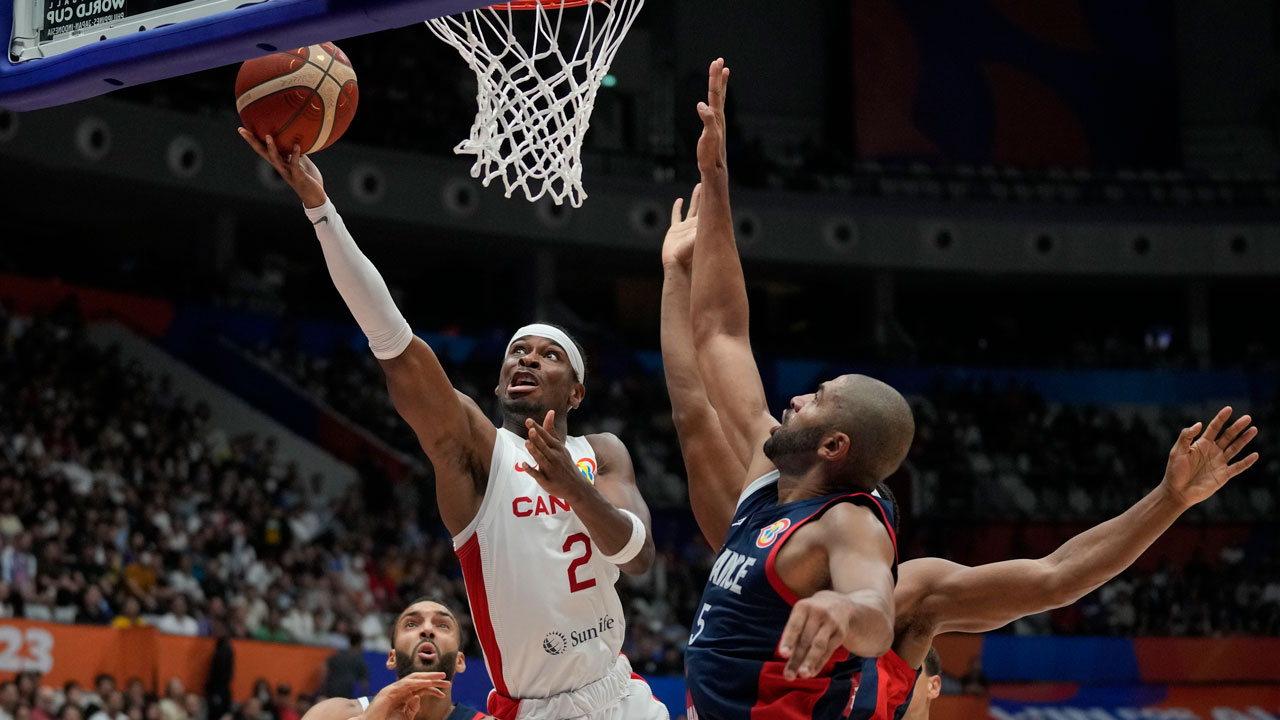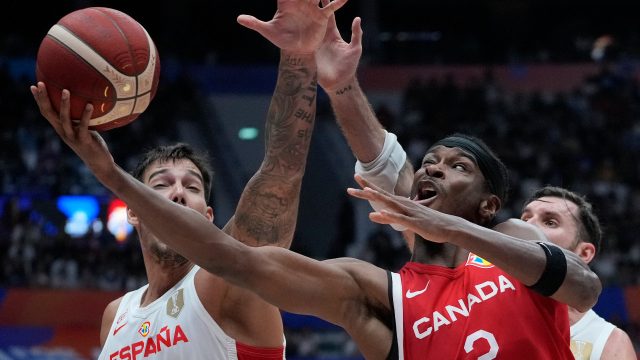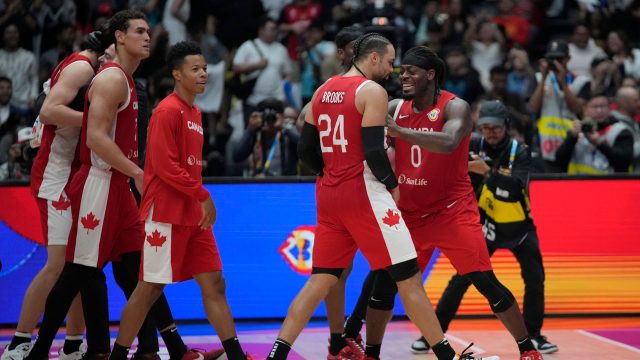
They did it.
You knew they could do it. The Canadian men’s national team has been the best team in the Americas (non-USA division) for a decade now. It’s just facts.
The Canadians blew away the field at the Tournament of the Americans in 2015 before tripping over Venezuela with an Olympic berth on the line. They pushed a very talented French team to the limit at the Olympic Qualifying Tournament in Manila the following summer. Their cumulative record in World Cup qualifying windows dating back to 2018 is 21-3. In Victoria they lost to a Thomas Satoransky buzzer-beating, leaning, bank shot with an opportunity to go to the 2020 Olympics.
But the bittersweet truths of sports is that until you get the job done in the moment, when required, everything else doesn’t matter.
It’s not fair and when you factor in luck and circumstance it doesn’t even tell the entire story.
But with their shocking, impressive, inevitable, deserved, nail-biting and unlikely 88-85 win over Spain in Jakarta on Sunday, there is a new story to tell, and it has a very happy ending. Not only does Canada remain in the hunt for the FIBA Basketball World Cup, but the team is also going to the Olympics in Paris in 2024. Pack your bags.
Canada has taken its place among the world’s best. It’s about time, sure, but it only makes it that much sweeter.
The Canadian men’s team should have been at the Olympics in 2016 and very well would have been at the 2020 Olympics, had it not been delayed a year due to COVID. (Oh, you don’t think having Jamal Murray available for the Olympic Qualifying Tournament in 2020, rather than being sidelined with an ACL injury in the summer of 2021, wouldn’t have made the difference?)
But things happened. Venezuela came back from down seven with less than three minutes to play and ruined Canada’s Olympic chances on with a pair of free throws made with no time on the clock after a phantom off-ball foul. COVID happened. Murray tore his ACL. Satoransky somehow got a shot off over the outstretched fingertips of Lu Dort.
Canada lost games it absolutely needed to win and likely should have, and the scar tissue accumulated.
Just on Friday it seemed like the Canadians ripped open a new wound when they allowed a good but certainly not great Brazilian team to hang around long enough that they could steal a win at the end.
It was a stunner and, given the quality and commitment of the current Canadian lineup, perhaps the toughest of all of the men’s teams inexplicable losses of the past decade.
They were healthy, playing well, deep in talent and had the game’s best player in Shai Gilgeous-Alexander, and they still couldn’t win with a chance to advance to the quarterfinals at stake and — quite likely — an Olympic berth.
The only difference was this time Canada’s stumble wasn’t do or die.
What it did do was make Sunday morning’s game against Spain do-or-die. Win, against the No.1 ranked team in the world, no less, and Canada would advance to the quarter finals. Lose and a chance to directly qualify for the 2024 Olympics would be quashed. Lose and it would be more questions, more doubts, and perhaps most crushing, a rush of apathy — a normal reaction after a decade of optimism about what might.
But they did it. And with Dominican Republic losing to Serbia in the other half of the draw, Canada not only advanced to the quarterfinals with a real chance at earning the country’s first medal at a global senior competition very much alive, but a spot in Paris booked.
The enormity of the accomplishment could be seen in the reactions: RJ Barrett, who sparked Canada with an 11-point first quarter, was dancing when he got the news that he would follow in his father’s footsteps and play basketball in the Olympics 24 years after Canada Basketball men’s general manager Rowan Barrett did it, just months after his son was born.
Dwight Powell, the veteran big man who has used every inch of effort, character, and smarts to carve out a 10-years-and-counting NBA career, after being a mid-second-round draft pick, and who has answered the call for the men’s team so many times, was in tears.
Dillon Brooks, the mercurial forward who, for better and worse, plays without fear, and proved why that matters when he came through with some of the game’s biggest baskets, made a point of shouting out veteran Melvin Ejim, the old-head European pro who has been a guiding light for so many of younger teammates and never missed a chance on the bench to ask the group: “Who wants it most?”
It was validation and catharsis and triumph all at once. Kelly Olynyk was a basketball crazy eight-year-old when he got up in the wee hours of the morning in the summer of 2000 to watch Steve Nash lead Canada on an improbable run that stopped just short of the medal round the last time Canada made it to the Olympics.
Olynyk — whose father, Ken, was a coach with the national team program for years — made his senior team debut at the World Championship (as it was called then) in 2010. Canada went 0-and-5 and finished 22nd out of 24 teams, marking the low point in program history.
As Olynyk and an über-talented wave of Canadian players began making it to the NBA, it seemed almost a formality that international success would follow.
Instead it has been the worst kind of heartbreak: the kind when your hopes are high, justifiably so, and something keeps happening to screw everything up.
There were times against Spain when it felt like the record was on repeat and the curse was in full effect.
After a tough, competitive, and encouraging start — the game was tied 21-21 after the first quarter, a boon for Canada given its slow starts so far in the tournament — the cracks began to show in the second quarter.
With just over three minutes to play in the half, Canada gave up an open three, saw Brooks get whistled for a foul, and then pick up an unsportsmanlike foul on top of that for putting his forearm into the neck of Spain’s Willie Hernangomez on a box-out. Spain made both free throws and scored with possession awarded after the foul. It was a seven-point play, and it felt like the snowball was beginning to roll down the hill.
It felt more like an avalanche when, after coming back from down 10 at half, Canada fell behind by 12 to start the fourth. This after Spain finished the third with a 16-3 run that was like a greatest hits from Canadian failures over the years as their offence stalled and someone from somewhere else goes nuclear. In this case it was Spain’s Santiago Aldama lighting Canada up for a pair of threes sandwiched around a poster dunk.
All the old feels were back. The football was being pulled away by Lucy again. No, we can’t have nice things.
But all that ignores the plain facts: this Canadian team is very good, versions of it have been for nearly a decade, and it has a true superstar in Gilgeous-Alexander in the lineup.
Like two-time MVP Nash did in his time, Gilgeous-Alexander showed what’s possible when the best player on the floor is in your jersey.
He had plenty of help. Down seven with less than four minutes to play Gilgeous-Alexander found his cousin, Nickeil Alexander-Walker, open in the corner for a crucial three that seemed to take the lid off the basket after a long run of quality possessions by Canada ended in missed threes, most of them wide open.
Then, after a long stretch of sloppy, intense, tense, and physical play on each side, some Gilgeous-Alexander magic: a series of pace-shifting dribbles in a crowd only to slither free for a lay-up, foul and three-point play to pull Canada within a point.
Shortly after, Gilgeous-Alexander found Brooks open for a three and the Houston Rockets signing didn’t hesitate, rising up and giving Canada its first lead since the second quarter, finishing off his best game of the tournament with 22 points on 8-of-12 shooting.
Game tied with 70 seconds to play.
Brooks followed up by forcing a turnover. Gilgeous-Alexander then put Canada up for good with a lethal step-back jumper from the top of the key that will be replayed for decades, and Brooks got another stop for Canada with a deflection before Gilgeous-Alexander finished his 30-point effort by knocking down four free throws in the final 21 seconds.
It was the opposite of everything that has happened in Canadian basketball — on the men’s side at least — for nearly a decade.
Disaster was averted. The moment was seized. Great players made big plays.
It’s exactly what everyone believed could happen but simply hadn’t to this point.
But this time it did, and now history can begin to make itself anew.







